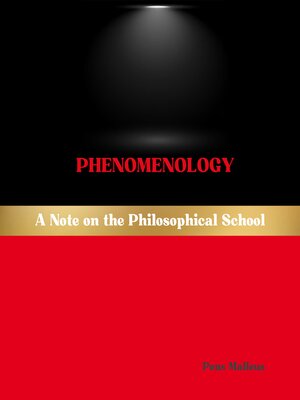Phenomenology
audiobook (Unabridged) ∣ A Note on the Philosophical School · Western Philosophical Schools
By Pons Malleus

Sign up to save your library
With an OverDrive account, you can save your favorite libraries for at-a-glance information about availability. Find out more about OverDrive accounts.
Find this title in Libby, the library reading app by OverDrive.



Search for a digital library with this title
Title found at these libraries:
| Library Name | Distance |
|---|---|
| Loading... |
This audiobook is narrated by a digital voice.
The history of philosophy is marked by repeated attempts to return to what is most fundamental—what is given before all interpretation, theory, or abstraction. Phenomenology is one of the most ambitious and enduring of these attempts. Born in the early 20th century out of a dissatisfaction with both the dogmatism of traditional metaphysics and the abstraction of scientific positivism, phenomenology proposed a radical new beginning: to return "to the things themselves." This phrase, made famous by Edmund Husserl, captures the spirit of a movement that sought to suspend presuppositions and examine conscious experience in its purest form.
This book is an invitation to explore the philosophical school of thought known as phenomenology—not merely as a historical curiosity, but as a living and evolving tradition. From Husserl's rigorous investigations into intentionality and the structures of consciousness, to Heidegger's existential interpretation of Being, to the embodied turn found in Merleau-Ponty and the ethical dimension in Levinas, phenomenology has expanded the scope of philosophy. It has touched disciplines as diverse as psychology, literature, cognitive science, architecture, and theology.
Phenomenology is often misunderstood. To some, it appears obscure, overly technical, or too abstract to bear relevance to ordinary life. Yet at its heart lies a simple yet profound intuition: that our conscious engagement with the world is not incidental to knowledge but foundational to it. Phenomenology does not aim to describe the world from an external vantage point, but rather seeks to understand how the world is revealed through lived experience. In doing so, it offers a method for investigating meaning as it arises in the first-person perspective—an approach that has proven to be both fertile and transformative.







